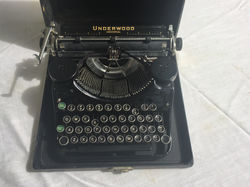
Rose: her life outside of internment
CHILDHOOD
No. 328 Bush Street, a tall cherry tree casted its shadow upon the concrete walks around this new home of ours. Dry, yellow grass swept up to the sides of the wood steps. The late summer’s breeze gently pushed its way into the entrance of the white door. The paint was weathering and peeling. One would know that this was an old house but it was a new abode for me.
There were five in the family of ours. My father, mother, sister, Lena, who was four years older than I, and my brother, Jimmie, two years younger than I. I had just moved from my birth town, Independence into Salem, Oregon, where father was to be employed at the Marion Hotel as a cook. For this reason, I cannot remember the house where this dubiously blessed event took place. All I can gather from mother is that the wooden home was built on the west side of the railroad tracks. The city was hardly unknown except to laborers who would dwell in the hop yards during harvest to earn their year’s income.
My father and mother came from typical Japanese families. Their parents were raised and toiled on the eroded and impoverished rice fields. They were hard workers, and for that reason my parents are too. Father disliked school but mother was the exact opposite. Mother’s education was terminated after grandfather lost in the stock share. He was a man with a kind heart. Early in the nineteenth century, my parents came to the United States. They couldn’t speak or read English. They had learned that America was a rich land. In the days of pioneering, they worked in the sugar beet fields and hop yards from dawn to dusk. Even to this day, they will not forget the days they toiled to earn enough money and to return to their motherland some happy day.
I couldn’t see my mother like most children did. During the hours she was working in the fields, my sister took care of me. For this reason, I still feel that I have missed the tender mother’s caress, and the warmth of her body. My sister and brother would often play with their toys and I was always overlooked. I would only cry when I was hungry. She worried about me thinking that I wasn’t mentally complete.
My younger sister, Pearl, was born when I was three years old. My playmates were my two sisters and only brother. I spoke Japanese until I entered grammar school. I was very poor in English and thus failed during my second grade in reading. I was always frail and quiet. Mother wouldn’t let me partake in games or playing with boys.
My face was round and fat. My eyes were always sparkling and big. Teachers called me a Japanese doll. I was always liked by the instructors. Pet was my name until I left that school.
My brother and I were the closest to each other. I would play with him and would go to school with him. He would stand by me at all times. We both enrolled at summer school together. I went there to make up for reading. We used to ride to school on the orange scooter which father bought him. I would grasp the handles lightly and he pushed with his right leg. We were too tired to walk home one summer afternoon so we stopped a driver to give us and the scooter a ride. When mother heard that we rode with strangers she took the scooter away from us.
I’ll never forget the time I was a “Rose Bud” at the school May Day. I led the long row of beautiful dolls dressed in pink crepe paper dresses and rows and rows of petals sewed to the skirt. I wore my first pair of pink silk anklets and white shoes. I looked my loveliest.
Pieces of my grandma's life
 |  |  |
|---|---|---|
 |  |
Top left is the wood cover of my grandma's journal that dozens of members in her internment camp signed. Right is her stylish wedding outfit she wore when she married my grandpa. Lower left is her typewriter she wrote with in camp. Bottom middle is the blanket she crocheted in the internment camp and kept it pristinely white despite the leaking roof and dusty days.
After Internment
Chicago, Illinois and Brighton, Colorado

My grandma was sponsored out of the camp by Quakers in Chicago, Illinois. She worked as a secretary at the YWCA. Months later her sister brought her parents to Chicago and they lived one floor apart in their apartment building. She met my grandpa, Charles (Chili) Fujisaki, at a Japanese American Citizens League Dance. He proposed a while later by asking "Do you want to get married," and she responded "grab me before it's too late."
They later moved to Brighton, Colorado where they had three kids: Patrice, Charles (Keith) and Craig. Rose was an excellent typist and writer. She could cook anything. She was grandpa's personal accountant when he opened his family practice as a doctor. She was patient, kind, and was always perfectly dressed.
My grandma passed away in 2015 at age 94. I respect and love her even more after completing this project. I'm so proud to be her granddaughter.